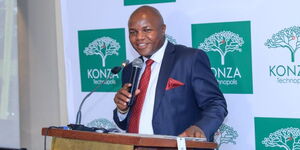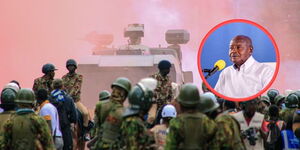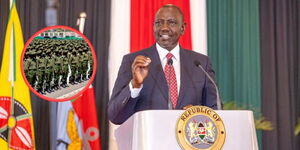Haiti's Prime Minister Garry Conille has robustly defended his decision to replace the national police chief just days before the scheduled deployment of Kenyan troops to the embattled Caribbean nation.
In a press conference on Thursday, June 20, Conille justified the decision to appoint Rameau Normil as the new director-general of the Haitian National Police, replacing Frantz Elbe. Conille emphasised that the change was essential to inject new energy into the police force and enhance its ability to combat the gangs terrorising the population.
"We took steps to make a change at the head of the police because we felt the time was right to give the institution a new lease of life, a new energy," Conille declared. He stressed that addressing the escalating insecurity in Haiti is a collective responsibility, urging the public to engage more actively in the process of restoring security. Conille also promised improved communication between citizens and the police force to build trust and cooperation.
The leadership shift in Haiti’s police force has sparked significant debate, particularly concerning the timing of the change as Kenya prepares to deploy troops to support Haiti’s security operations. Questions loom over whether the combined efforts of Haiti and Kenya will be sufficient to dismantle the gangs while upholding human rights.
This development follows a recent delegation of Haitian police officials who met with the Kenyan Inspector General of Police Japheth Koome and other senior commanders in Nairobi. Haitian Police official Joachim Prohete expressed confidence in Kenya’s support during the meeting.
On Wednesday, President William Ruto of Kenya held discussions with Haiti’s Transitional Presidential Council, chaired by Edgard Leblanc. These talks, which took place a day after Haitian police commanders concluded their visit to Nairobi, also involved Kenya’s National Security Adviser Monica Juma and Deputy Inspector-General of Police Noor Gabow, who is set to lead the Kenyan team deployed to Haiti. President Ruto reaffirmed Kenya's commitment to multilateralism and international cooperation as enshrined in the United Nations Charter, emphasizing the shared values of peace, security, and stability.
"We will safeguard shared principles of humanity that enable us to advance peace, security, and stability," President Ruto assured the meeting. He highlighted the importance of establishing robust communication channels as part of the ongoing efforts to restore peace in Haiti.
Prime Minister Conille confirmed his discussions with Kenyan authorities, expressing mutual eagerness to collaborate on the UN-backed security mission aimed at strengthening Haiti’s police force. However, he noted that the mission, initially scheduled to deploy by May 23, had been postponed due to logistical challenges identified by a Kenyan assessment team. The team cited a lack of adequate armoured vehicles, radios, and other communication equipment, as well as helicopters needed for casualty evacuation.
Conille also announced plans to implement a national anti-corruption strategy to address inefficiencies within the state apparatus. He pointed out that up to 30 per cent of state employees are reportedly receiving salaries despite being absent from work, a practice that needs immediate rectification.
Gang violence has plagued Haiti for years, but the situation has deteriorated sharply since late February when armed groups launched attacks in the capital, Port-au-Prince, calling for the ousting of the unelected and unpopular Prime Minister Ariel Henry. In March, Henry announced his intention to step down and transfer power to a transitional council, which appointed Conille as the interim leader in late May.
The ongoing violence has forced approximately 580,000 Haitians to flee their homes, representing a staggering 60 per cent increase since March, according to the UN International Organisation for Migration.












